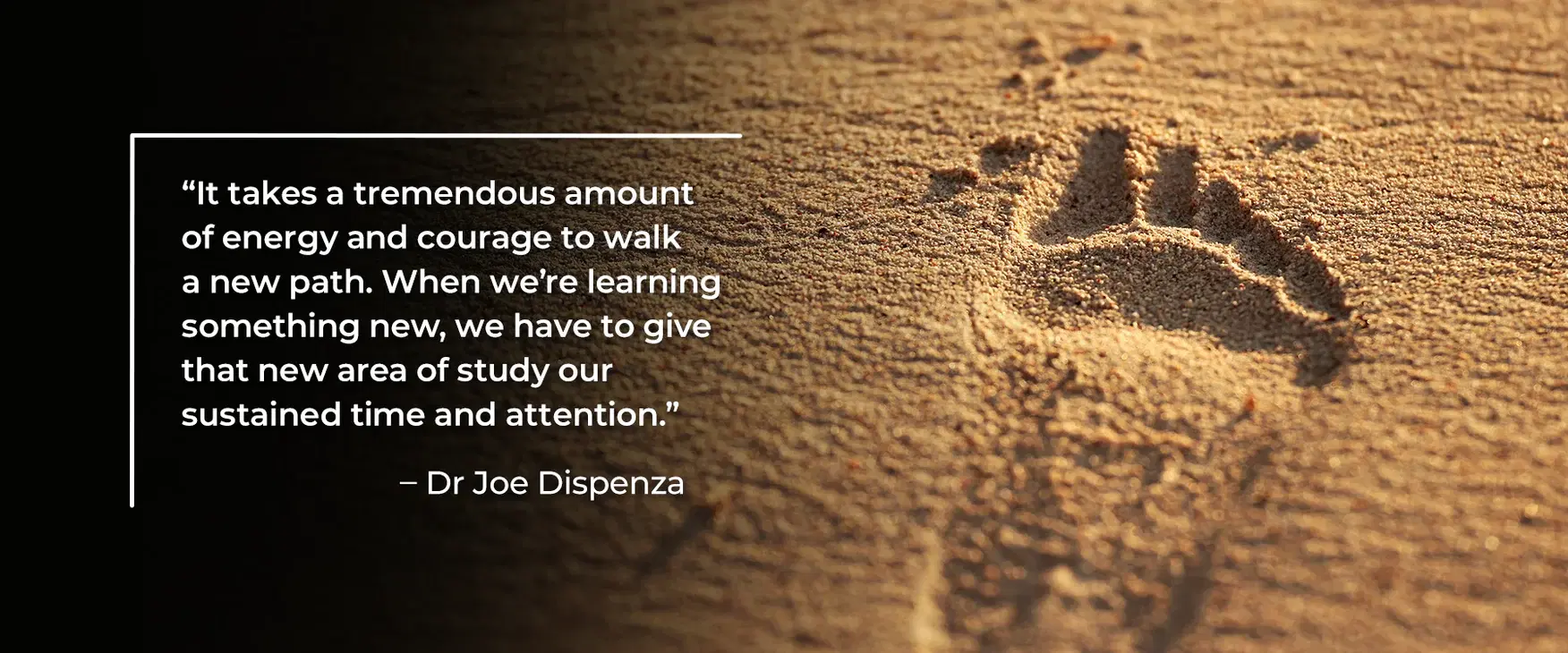Choice Points on the Path — Part I
Dr Joe Dispenza | 23 September 2022
My team and I recently returned from a long stretch of travel; leading retreats from Switzerland … to England … to Florida and New York over a period of 40 days. I try to make time to meet with members of our community during each event, and I’m always struck by the insights, challenges, breakthroughs, and questions that arise at various points of their practice.
After this particularly powerful period of evolution – in our work and in our community – I want to share with you some observations about choices we all encounter at different stages along the path … stages of study and practice I refer to as Novice, Initiate, Master, and Virtuoso.
The Novice: “I choose something different.”
For someone just entering the work, this stage is all about the acquisition and understanding of knowledge and information. As novices, we’re learning the content. We’re remembering and rehearsing its meaning intellectually, theoretically, and philosophically – and trying to make sense of it with our thinking neocortex. We’re building neural architecture; creating new infrastructure in our brain. Essentially, we are creating a new mind.
Choosing something “different” may seem vaguely stated, but it’s literally true. When we begin to walk the path of a seeker or a mystic, it means we’ve come up against some aspect of our lives – of ourselves – that’s no longer working for us. For some who come to this work, it’s a crisis: a dire diagnosis. Or the end of a relationship. Financial hardship. For others, it may be a general sense of dissatisfaction or unease. Not necessarily an emergency, but – an emptiness.
Whatever brings us to the point of choosing something different, it’s because we finally realize that continuing to choose the same – the same thoughts; same feelings; same habits; same emotional reactions – will bring us only more of the same experiences.
To choose something different is to choose to leave the past – to leave our old selves – behind. It’s the only way we can enter the present moment – and give ourselves the opportunity to create something new.
It takes a tremendous amount of energy and courage to walk a new path. When we’re learning something new, we have to give that new area of study our sustained time and attention. We must etch what we’re learning into our brain by constantly weighing what we know against what we don’t know. We must understand the what and the why – so we can begin to naturally rehearse in our minds how we’re going to apply it.
At this early stage of learning, it’s important to be patient with our process. We shouldn’t put pressure on ourselves with anger or frustration. I often tell my students at this stage, “You’re just not that good yet.” And it’s not meant to be discouraging; just the opposite. When we’re just starting out, we need to give ourselves a break. We need to let go of expectations – and be kind to ourselves.
All of this is part of philosophy and theory. At the novice stage, we’re installing hardware in our brain … so when it comes time to transition from the theoretical to the practical, we’re ready. Now, it’s time to get our body involved – and initiate some new action.
The Initiate: “I choose evolution.”
If we spend all our time learning and talking about something new, but never take action, then we never move beyond being a novice or philosopher. We have to do something with the information we’ve acquired. We have to initiate it. And we have to match our body with our mind in the practical application of that knowledge – to get closer to creating a new experience.
At this stage, we’re intentionally deciding to evolve by making a new choice. We take the new neural networks we’ve begun to hardwire into our brain – and we practice doing something with them. And we practice. And practice some more. This stage of learning and creating takes constant rehearsal (mental as well as physical) – and constant repetition.
And it takes some time – and a lot of awareness and energy. Let’s face it; we’re going to make mistakes. And then we have to go back and unlearn whatever it was that caused us to veer off the path … and relearn the new ideas and behaviors we’re practicing. And that takes patience. And it requires a tremendous amount of awareness – so we don’t react emotionally. It also takes governing our constantly analyzing and overthinking brain.
As an initiate, we have to stay conscious. We have to employ restraint – so we don’t fall back into our old programs. We have to practice with our eyes open so we can actually perform the new behavior. We keep doing. We keep learning from our mistakes. We keep self-correcting. And we refine the act.
When we’ve actually created an experience, there’s an enrichment of circuitry in the brain – and an emotion that’s created from that experience. And that emotion is instructing the body to understand chemically what the mind has understood intellectually. At the same time, networks of neurons enhance the philosophical mind through the experience. Now, the information is further etched in the mind – and conditioned in the body.
In taking the knowledge we’ve acquired as a novice, and applying it as an initiate, we say to ourselves: “Can I do this better? Can I evolve and enrich my experience? Can I perfect my experience? Can I produce an outcome once? And if I can do it once, can I do it again?”
When we’ve put in our time and become good at creating – and recreating – we’re ready for the next level: mastery. We’ll talk more about that in Part II.

Comments